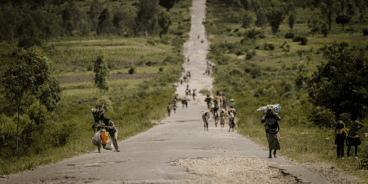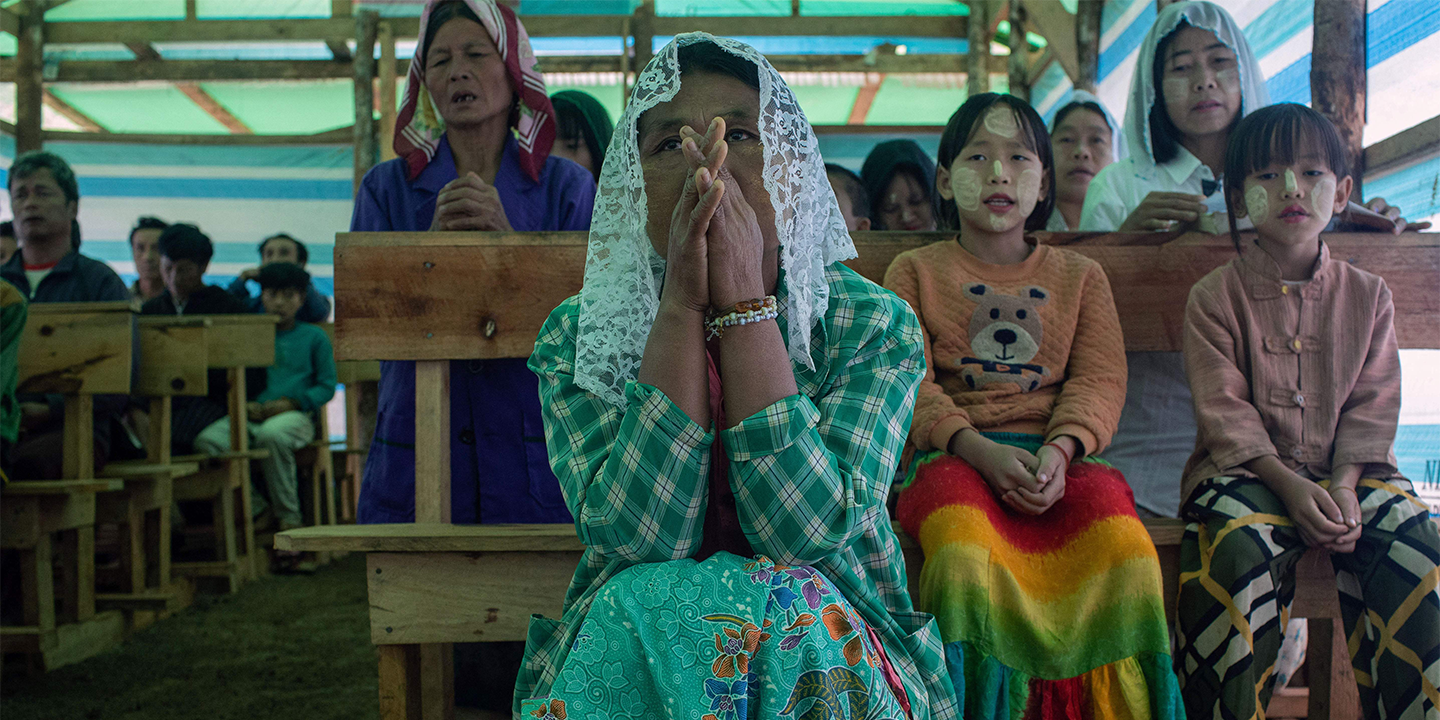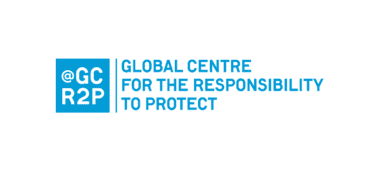

Atrocity Alert No. 374: Myanmar (Burma), Israel and the Occupied Palestinian Territory and Accountability
Atrocity Alert is a weekly publication by the Global Centre for the Responsibility to Protect highlighting situations where populations are at risk of, or are enduring, mass atrocity crimes.
HUNDREDS OF CIVILIANS KILLED IN ESCALATIONS ACROSS MYANMAR
At least 200 civilians have been killed and 335,000 displaced in Myanmar (Burma) since 27 October when a group of ethnic armed resistance organizations – known as the Three Brotherhood Alliance – launched a campaign against the ruling military junta. “Operation 1027” has galvanized other groups across the country to join in attacks against the junta, making the current fighting the “largest in scale and most extensive geographically” since the February 2021 coup, according to the UN Office for the Coordination of Humanitarian Affairs (OCHA). Clashes have been particularly heavy in northern Shan, Sagaing, Chin, Rakhine and Mandalay states where armed resistance groups have reportedly targeted military bases and outposts, as well as trade routes.
In Rakhine State, a year-long informal ceasefire between the junta and the Arakan Army ethnic armed group ended on 13 November when the group launched attacks. According to OCHA, 20,000 people have fled the fighting since mid-November in Pauktaw township alone. The junta has cut off access to the town and trapped hundreds of people in the crossfire, while also obstructing access to camps for internally displaced Rohingya.
On 17 November the Spokesperson for the UN High Commissioner for Human Rights, Jeremy Laurence, warned that, “As the military loses ground on multiple fronts,” and given past patterns of behavior, “its response risks unleashing an even greater force, through indiscriminate and disproportionate air strikes and artillery barrages.” The junta has so far responded to the assaults with intense aerial bombardments of urban areas, declarations of martial law in major towns, communications blackouts and denial of access to humanitarian workers. The blockage of roads and other access points by the junta and armed groups has impeded civilians’ ability to seek shelter and for humanitarians to deliver vital assistance.
Over the past two years civilians have been victims of targeted and indiscriminate airstrikes, extrajudicial executions, torture and the military’s scorched earth tactics. Attacks on populations perceived to be unsupportive of the junta have sharply escalated in 2023, including through aerial bombardments, arson and gruesome attacks on civilians unable to flee. The junta has also systematically denied humanitarian aid. Indiscriminate attacks on civilian populations and the denial of humanitarian aid are prohibited under international law and may amount to war crimes and crimes against humanity.
Myanmar expert at the Global Centre for the Responsibility to Protect, Sarah Hunter, said, “The spotlight must remain on Myanmar. The international community should prevent the spiral of violence and ensure the protection of the civilian population in Myanmar by taking decisive and coordinated action to sanction the weapons, finances and fuel that enable atrocities to continue.”
TEMPORARY HUMANITARIAN PAUSE IN ISRAEL AND GAZA BRINGS VITAL RELIEF TO CIVILIANS
After weeks of relentless airstrikes and ground fighting in Gaza and rocket fire directed toward Israel, the Israeli government and Hamas agreed to a four-day humanitarian pause, which entered into effect on 24 November and has been extended for a further two days until 30 November. As of 28 November this temporary pause in hostilities has facilitated the release of 61 Israeli and 20 foreign hostages that have been held captive in Gaza since Hamas’ attack on 7 October, as well as the release of 180 Palestinians – many of whom are women and children detained without charge – from Israeli prisons. Since the start of the pause, airstrikes, shelling and ground clashes have largely halted, except for reported exchanges of fire on 28 November between Israeli forces and Palestinian armed groups in Beit Hanoun. Israeli forces have also reportedly used tank fire in areas in the south. At the time of publication, negotiations are ongoing to secure an extension of the humanitarian pause.
The pause in fighting also allowed humanitarian actors to accelerate the delivery of aid across the Gaza Strip, including to areas north of Wadi Gaza that have been largely cut off from humanitarian aid for weeks. Prior to the pause, Israeli forces severed north Gaza from the south, heightening concerns of dehydration and starvation among Palestinians in the north. Since 24 November dozens of trucks have been able to reach areas in northern Gaza, delivering medical supplies, ready-to-eat food, wheat flour, bottled water, tents and blankets, as well as small amounts of fuel to water production facilities. On 27 November Palestinians in the north had their first access to clean water in weeks. As a result of the pause, key service providers across Gaza – including hospitals, water and sanitation facilities and displacement shelters – have received much-needed fuel to enable their vital operations.
UN Secretary-General António Guterres welcomed the increased deliveries, stating that the two-day extension is “a glimpse of hope and humanity in the middle of the darkness of war.” However, he separately emphasized that the increased aid “barely registers against the huge needs of 1.7 million displaced people. The humanitarian catastrophe in Gaza is getting worse by the day.”
Israeli forces announced at the start of the pause that the movement of people from the south to the north is prohibited. Despite this, several thousand Palestinians that previously fled to the south attempted to return to their homes in the north in recent days. There have been reports of Israeli forces opening live fire and throwing teargas canisters at those moving north, resulting in dozens of casualties.
Though temporary humanitarian pauses in hostilities allow for the necessary release of hostages and bring much-needed relief to suffering civilians in Gaza, this must be urgently translated into a permanent humanitarian ceasefire that brings an end to all hostilities.
HOLDING STATES ACCOUNTABLE FOR ATROCITIES AT THE INTERNATIONAL COURT OF JUSTICE
During November we have witnessed numerous critical steps toward ensuring accountability for atrocity crimes and preventing further abuses in Myanmar (Burma), Syria and Nagorno-Karabakh through cases at the International Court of Justice (ICJ).
On 15 November Canada, Denmark, France, Germany, the Netherlands and the United Kingdom jointly filed a declaration of intervention in The Gambia v. Myanmar case at the ICJ. The Maldives filed a separate declaration. With the declarations, these countries will be able to make legal arguments in the historic suit filed by The Gambia in November 2019 for Myanmar’s alleged violations of the Genocide Convention against the minority Rohingya population.
The Rohingya have suffered decades of institutionalized persecution and in 2017 faced so-called “clearance operations,” which were characterized by indiscriminate killings, sexual violence and forced displacement on a massive scale. Impunity has not only facilitated the commission of mass atrocity crimes against the Rohingya and other minorities but also enabled the 2021 coup and created a permissive environment for the ensuing violence and atrocities across Myanmar. The intervention of other countries in support of The Gambia strengthens the case and increases pressure on the military.
In Syria, thousands of people have suffered from alleged torture and ill-treatment while held in detention by the government in the context of the country’s ongoing conflict. On 8 June Canada and the Netherlands jointly initiated proceedings at the ICJ against Syria concerning alleged violations of the Convention against Torture and Other Cruel, Inhuman or Degrading Treatment or Punishment. On 16 November the ICJ issued provisional measures calling on the Syrian government to take steps to prevent acts of torture and other cruel, inhuman or degrading treatment or punishment, ensure its officials do not commit any acts of torture and guarantee the preservation of any relevant evidence.
On 17 November the ICJ issued provisional measures calling on Azerbaijan, in accordance with its obligations under the International Convention on the Elimination of All Forms of Racial Discrimination, to ensure that people who fled Nagorno-Karabakh after 19 September and who wish to return are able to do so in a safe, unimpeded and expeditious manner and guarantee that those who remain in Nagorno-Karabakh are free from the use of force or intimidation, among other actions. Provisional measures issued by the ICJ – like those issued for Myanmar, Syria and Nagorno-Karabakh, among others – are intended to provide obligatory temporary protective or injunctive relief in relation to the violations in question, pending a decision on the dispute.
Savita Pawnday, Executive Director of the Global Centre for the Responsibility to Protect, said, “Holding the perpetrators of atrocities accountable can play a crucial role in inhibiting the recurrence of these crimes. We welcome these recent developments at the ICJ and reiterate the international community’s commitment to ensuring that all victims and survivors of mass atrocity crimes receive the recognition and justice they deserve.”
The international community should ensure continued financial and political support to all efforts aimed at fighting impunity. States should urge compliance by Myanmar, Syria and Azerbaijan with their respective provisional measures. States can also aid in ensuring accountability by formally intervening in cases pertaining to atrocity crimes and, where possible, pursue accountability for perpetrators under the principle of universal jurisdiction.
Related Content


